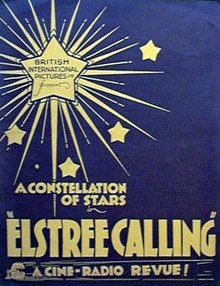|
Elstree Calling
Elstree Calling is a 1930 British comedy musical film directed by Adrian Brunel and Alfred Hitchcock at Elstree Studios.[1] SynopsisThe film, referred to as "A Cine-Radio Revue" in its original publicity, is a lavish musical film revue and was Britain's answer to the Hollywood revues which had been produced by the major studios in the United States, such as Paramount on Parade (1930) and The Hollywood Revue of 1929. The revue has a slim plot about its being a television broadcast. The film consists of 19 comedy and music vignettes linked by running jokes of an aspiring Shakespearean actor and technical problems with a viewer's TV set. Production backgroundAmong Hitchcock's contributions was the comic linking segments about a man trying to "tune in" the revue on his television set, but always failing to get the picture for long because of his needless tinkering. In the UK, John Logie Baird's work in mechanical television in the 1920s made television a topical subject at the time. The film's ensemble numbers were staged by André Charlot, Paul Murray and Jack Hulbert. Imitating the lavish use of Technicolor by Hollywood studios at that time, four sequences in the film were coloured by the Pathécolor process,[1] which used stencils to tint selected areas of the black and white prints. In their book Film's musical moment, Ian Conrich and Estella Tincknell write:
CastIn credits order:
Supported by: Also with:
Copyright and home video statusLike Hitchcock's other British films,[3][4] Elstree Calling has been heavily bootlegged on home video.[5] As of early 2019, the officially licensed, preserved version has only appeared on DVD from Network Distributing in the UK.[1] See alsoReferences
External links |
||||||||||||||||||||||||
